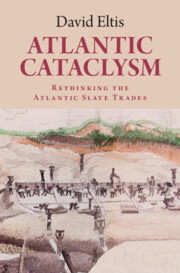Book contents
- Atlantic Cataclysm
- Atlantic Cataclysm
- Copyright page
- Epigraph
- Dedication
- Contents
- Figures
- Tables
- Maps
- Preface
- Acknowledgements
- Abbreviations
- 1 Atlantic Slave Trading and World History
- 2 The Americas and Atlantic Slave Trading: The Iberians and the Rest
- 3 Europe and Atlantic Slave Trading
- 4 The Portuguese System
- 5 Africa, Africans, and the Slave Trade
- 6 Abolition: A Leninist Interpretation
- 7 Freedom?
- Conclusion
- Index
5 - Africa, Africans, and the Slave Trade
Published online by Cambridge University Press: 13 December 2024
- Atlantic Cataclysm
- Atlantic Cataclysm
- Copyright page
- Epigraph
- Dedication
- Contents
- Figures
- Tables
- Maps
- Preface
- Acknowledgements
- Abbreviations
- 1 Atlantic Slave Trading and World History
- 2 The Americas and Atlantic Slave Trading: The Iberians and the Rest
- 3 Europe and Atlantic Slave Trading
- 4 The Portuguese System
- 5 Africa, Africans, and the Slave Trade
- 6 Abolition: A Leninist Interpretation
- 7 Freedom?
- Conclusion
- Index
Summary
For 350 years, African and European slave merchants traded with each other on the African coast as equals. Europeans generally recognized and accepted African rules on who could and could not be enslaved. When they did not, then trading relations would break down. The African names database allows the identification of the major slave-trading groups, at least for the nineteenth century. For most parts of the African Coast the ruling authority’s role was not to sell large numbers of people, but rather to provide a secure environment in which slave trading could take place. A wide-ranging database of African sellers shows that while large traders certainly existed, the great majority of sellers sold just five or fewer captives. The chapter evaluates the positions of four major Africanist scholars on relations between Europeans and Africans in light of the new quantitative work. It concludes that only one, John Thornton, has made arguments consistent with the new findings. Also it is now clear that slave traders in Africa, like those in Europe and the Americas, fronted a large labor force for growing provisions, guard-duty, and distribution of trading goods, especially in West Africa. Abolition is not likely to have had economic motives either at the level of the individual or the state.
- Type
- Chapter
- Information
- Atlantic CataclysmRethinking the Atlantic Slave Trades, pp. 196 - 246Publisher: Cambridge University PressPrint publication year: 2025

